Before his death in 2005, John Paul II expressed his wish to be remembered as “the Pope of the Family.” In fact, his special solicitude for the family and human love generally was evident in his pastoral work as a young priest and in his earliest writings, ranging from his play The Jeweler’s Shop to his 1960 book Love and Responsibility. It was not surprising, then, that John Paul’s pontificate should begin with several major initiatives closely related to his care for the family and marital love.
Famously, he devoted his early Wednesday audiences (1979-1984) to an extended reflection on the theological meaning of the body, marriage, love, and their relationship with the whole sacramental order of the Catholic faith. This body of work would come to be known as “the Theology of the Body.”
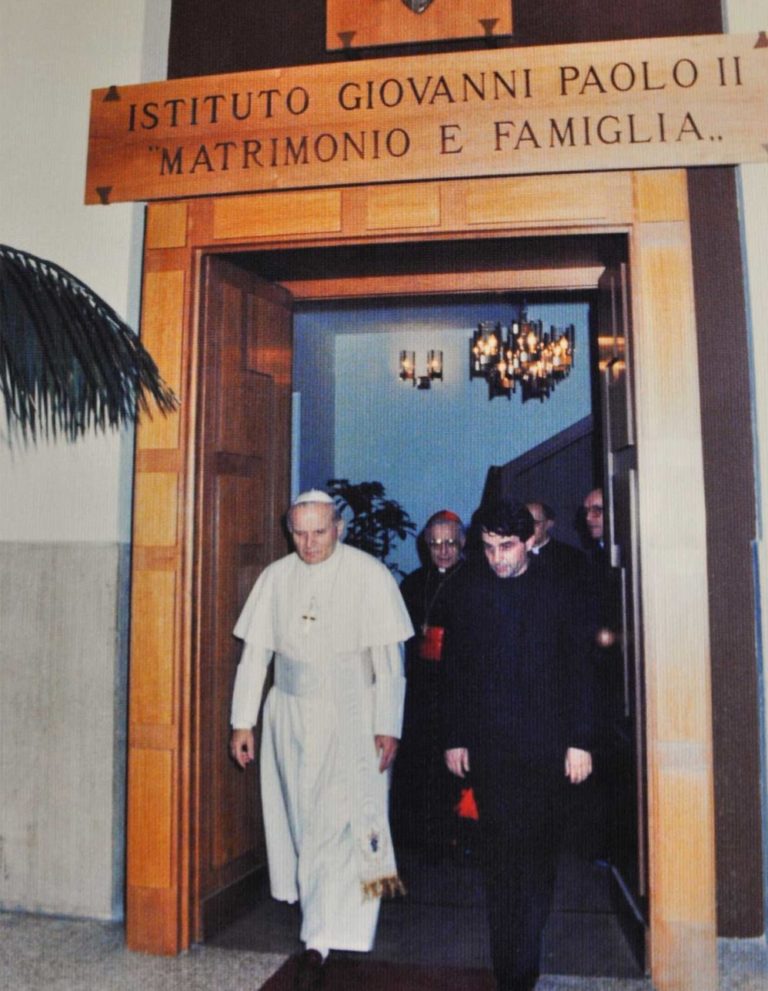
Responding to the 1980 Synod of Bishops’ recommendation, John Paul also established the Pontifical John Paul II Institute for Studies on Marriage and Family in Rome. The Institute’s founding was to be announced at the Holy Father’s Wednesday audience on May 13, 1981, but because of the attempted assassination that day, the Institute’s Apostolic Constitution, Magnum Matrimonii Sacramentum, was instead given on October 7, 1982, the Feast of Our Lady of the Rosary. On that occasion the Institute was entrusted in a special way to the care of the most Blessed Virgin Mary under her title Our Lady of Fatima.
The Institute’s mission, as conceived by John Paul II, is to engage some of the most vexed cultural and ecclesial questions facing the Church today: those arising from the relationship of man and woman, of marital love, and their implications for how we understand the human person. However, the Institute does not approach these from conventional moral or political perspectives. Rather, John Paul’s particular genius was to recognize that these issues were in fact the result or consummation of far more fundamental and far-reaching anthropological and metaphysical ambiguities, such as the cultural assumptions about the meaning of personhood and material reality.
This mission was extended to the English-speaking world with the founding of the American session of the Institute, located in Washington D.C., in 1988, at the request of His Eminence, James Cardinal Hickey, Archbishop of Washington, and Mr. Virgil C. Dechant, Supreme Knight of the Knights of Columbus. Among the founding faculty were Carl Anderson, who was both Dean and Professor of Law (and who became Supreme Knight of the Knights of Columbus in 2000), Rev. Benedict Ashley, O.P., and Msgr. Lorenzo Albacete. These were soon joined by other significant scholars, such as David L. Schindler, Margaret McCarthy, Rev. Francis Martin, William E. May, Kenneth Schmitz, and Msgr. Robert Sokolowski.
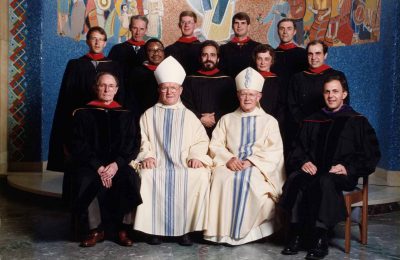
The American Institute’s first degree program was the Licentiate in Sacred Theology (S.T.L.), and indeed the first graduating class consisted of the ten S.T.L. students who completed their studies in 1990. However, the outpouring of lay interest in studying at the Institute led Dean Anderson to establish an American-style master’s program, the Master of Theological Studies (M.T.S.) in 1989. The M.T.S. was followed by the addition of the Doctorate of Sacred Theology with a Specialization in Marriage and Family (S.T.D.), which graduated its first students in 1994.
The continuing lay demand for theological formation ultimately led David L. Schindler, who became Dean in 2000, to inaugurate the Doctorate in Theology with a Specialization in Marriage and Family (Ph.D.) in 2004 and to begin the lengthy process of gaining full civil accreditation, which was achieved in 2011.
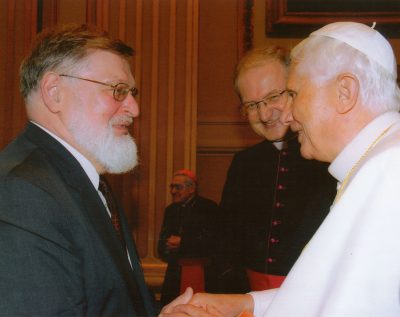
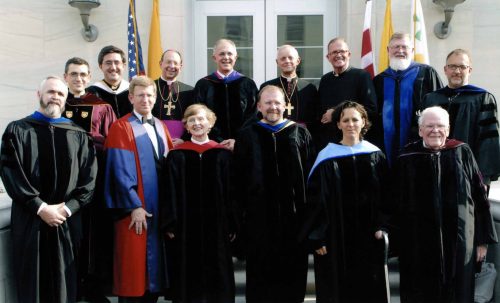
The Institute’s mission has been further aided in recent years by various developments. Under the visionary guidance of Provost/Dean Schindler, the Institute moved to its permanent residence in McGivney Hall at the center of the campus of The Catholic University of America in 2008. McGivney Hall, which was completely renovated by the Knights of Columbus for the purpose of housing the Institute, offers a prime location on the University campus and gives Institute students direct access to the library resources and student services guaranteed by the Institute’s cooperative agreement with the University. In addition, Provost/Dean Schindler created two tracks in the M.T.S. program, one in “Marriage and Family” and one in “Biotechnology and Ethics.”
Rev. Antonio López, who became Provost/Dean in 2010, helped expand the American Institute’s academic activities with the founding of Humanum Academic Press and the formation of a team of translators and editors to publish the English Critical Edition of the Works of Karol Wojtyła/John Paul II, the first volume of which was published in May of 2021. This latter, decades-long project constitutes a true gift to non-Polish scholars worldwide and therefore also to the whole Church. Fr. López’s tenure also saw the launch of the American Institute’s online quarterly journal Humanum: Issues in Family, Culture, and Science.
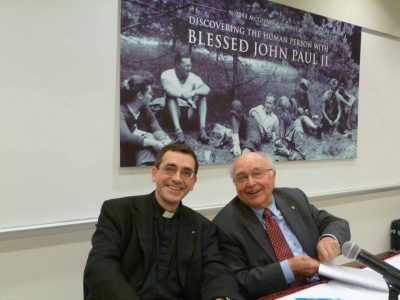
In 2021, the offices of Provost and Dean were separated, with Fr. López retaining the title of Provost and David S. Crawford becoming Dean.
The result of this thirty-year history is the American Institute’s dual standing. It is first an autonomous institute of graduate studies, offering under its own civil authority the M.T.S. and Ph.D. degrees, intended primarily for lay students and those wishing to teach in colleges or universities. But it is also a member of the international consortium of John Paul II Institutes (known as the John Paul II Pontifical Theological Institute for Marriage and Family Sciences since Pope Francis’s 2017 motu proprio Summa familiae cura) offering pontifical degrees (S.T.L. and S.T.D.), intended primarily for clerical students and those seeking to teach in seminaries, and granted under the authority of the Dicastery for Education and Culture.
In its 34 years of operation, the American Institute has awarded 619 degrees: 76% civil (73% M.T.S. and 3% Ph.D.) and 24% pontifical (17% S.T.L. and 7% S.T.D.). These percentages also correspond to the mix of lay and ordained or religious students and graduates over the years. Its graduates hold positions in parish and diocesan ministry; secondary education; public policy; law; medicine; journalism and publishing; business; and the arts. Graduates also teach in colleges, universities, and seminaries in the U.S.A., Canada, Australia, India, Spain, Poland, Lithuania, Uganda, Sierra Leone, and the Philippines, among others. Some of its graduates have become bishops.
Throughout this history, the Institute has remained dedicated to its founding principles and the mission to pursue with the greatest academic rigor the moral and political issues of the day to their utmost philosophical and theological roots.